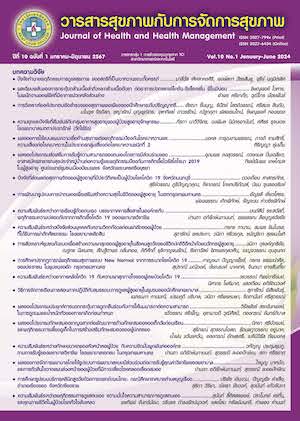The effect of Smart Executive Function (SMART-EF) Program on Preschool Children’s Executive Function and Parenting Behaviors in Enhancing the Executive Function of Children
Keywords:
Executive function, Parent, Preschool children, Child developmentAbstract
This research is quasi-experimental research. The objective is to evaluate the effectiveness of the Smart Executive Function (SMART-EF) on preschool children’s executive function and parents’ behaviors regarding promoting executive function. The sample group consists of parents and preschool children aged 3-6 who attend a child development center from January to December 2022. The sample was randomly selected, with 35 participants in the experimental group and 35 in the control group. The experimental group received the Smart Executive Function program, while the control group received regular care. Data were collected using: A questionnaire on pre-school parenting behaviors to enhance parental cognitive skills, with content validity of .95 and reliability of .86, Assessment of pre-school children’s executive function development using a standardized tool, with an index of item objective congruence (IOC) of 0.67-1.0 and reliability of .88. Statistical analysis involved descriptive statistics and an independent sample t-test.The research found that, after participating in the program, there was a statistically significant increase in the average scores of parenting behaviors related to enhancing cognitive skills in the experimental group compared to the control group at p<.01. Additionally, the average scores of cognitive skill development in pre-school children were significantly higher in the experimental group than in the control group at p<.001.This study suggests that health professionals or nurses can apply the “Smart Executive Function” program to parents of preschool children to promote self-awareness and consistent behavior in enhancing children’s cognitive skills effectively.
References
คันธรส ภาผล. (2563). ผลการจัดกิจกรรมนิทานหุ่นเงาที่ส่งผลต่อส่งเสริมการคิดเชิงบริหารสมองสำหรับเด็กปฐมวัย. วารสารครุศาสตร์สาร, 14(1), 100-113.
ชุมศิริ ตันติธารา. (2559). ผลการใช้โปรแกรมสร้างวินัยเชิงบวกที่มีต่อการทำงานของสมองด้านการจัดการของเด็กปฐมวัย. (วิทยานิพนธ์ปริญญามหาบัณฑิต). จุฬาลงกรณ์มหาวิทยาลัย, กรุงเทพฯ.
ณิชกุล พิชาชาญ, กิตติพงษ์ สอนล้อม, และศิริภัททรา จุฑามณี. (2566). ปัจจัยที่มีความสัมพันธ์กับพัฒนาการเด็กปฐมวัย: การทบทวนวรรณกรรมอย่างเป็นระบบ. วารสารโรงพยาบาลสิงห์บุรี, 31(3), 128-142.
ดวงฤทัย เสมคุ้มหอม, ปรียสลิล ไชยวุฒิ, สุดารัตน์ วันงามวิเศษ, และธมกร เธียรภูริเดช. (2563). การส่งเสริมการคิดเชิงบริหารของเด็กปฐมวัย. วารสารมหาจุฬานาครทรรศน์, 7(10), 16-31.
ดวงฤทัย เสมคุ้มหอม, อาภาวรรณ หนูคง, สมสิริ รุ่งอมรรัตน์, และนวลจันทร์ จุฑาภักดีกุล. (2562). ปัจจัยที่มีความสัมพันธ์กับการคิดเชิงบริหารของเด็กก่อนวัยเรียน. วารสารสภาการพยาบาล, 34(4), 80-94.
ดุษฎี อุปการ, และอรปรียา ญาณะชัย. (2561). การเสริมสร้างพัฒนาการการเรียนรู้ของเด็กปฐมวัยควรเลือกใช้หลักการใด การเรียนรู้โดยใช้สมองเป็นฐาน หรือการคิดเชิงบริหาร. วารสารวิชาการ Veridian E-Journal, Silpakorn University ฉบับภาษาไทย สาขามนุษยศาสตร์ สังคมศาสตร์และศิลปะ, 11(1). 1635-1651.
นวลจันทร์ จุฑาภักดีกุล, ปนัดา ธนเศรษฐกร, อรพินท์ เลิศอาวัสดาตระกูล, และนุชนาฎ รักษี. (2560). การพัฒนาและหาค่าเกณฑ์มาตราฐานเครื่องมือประเมินการคิดเชิงบริหารในเด็กปฐมวัย (พิมพ์ครั้งที่ 1). กรุงเทพฯ: ศูนย์วิจัยประสาทวิทยาศาสตร์สถาบันชีววิทยาศาสตร์โมเลกุล, มหาวิทยาลัยมหิดล.
นันทา โพธิ์คำ. (2563). ทักษะสมอง EF สำหรับเด็กปฐมวัย. วารสารมหาวิทยาลัยมหามกุฏราชวิทยาลัย วิทยาเขตร้อยเอ็ด, 9(2), 707-721.
ปาริชาติ อาษาธง, และทองมี ผลาผล. (2565). การพัฒนารูปแบบการส่งเสริมทักษะการคิดเชิงบริหารของเด็กปฐมวัยแบบมีส่วนร่วมของครอบครัวและชุมชนในจังหวัดร้อยเอ็ด. วารสารพยาบาลสภากาชาดไทย, 15(2), 266-282.
ปรัชญาพร ธิสาระ, จุฑามาศ ผลมาก, เพชรลดา สีขาว, และบุษยารัตน์ ศิลปวิทยาทร. (2560). ปัจจัยทำนายพฤติกรรมส่งเสริมพัฒนาการเด็กปฐมวัยของผู้ปกครองในจังหวัดพะเยา. วารสารการพยาบาลและการดูแลสุขภาพ, 35(2), 169-176.
ภควดี นนทพันธ์. (2561). ปัจจัยที่มีความสัมพันธ์กับพฤติกรรมการส่งเสริมพัฒนาการเด็กปฐมวัยของผู้เลี้ยงดูเด็ก จังหวัดสงขลา. วารสารวิทยาลัยพยาบาลพระจอมเกล้า จังหวัดเพชรบุรี, 1(3), 10-24.
ลัดดา เหลืองรัตนมาศ, สมปรารถนา สุดใจนาค, ณัฏฐา วรรธนะวิโรจน์, และวารุณี มีหลาย. (2564). ปัจจัยที่มีอิทธิพลต่อการคิดเชิงบริหารของเด็กวัยก่อนเรียน, วารสารพยาบาลกระทรวงสาธารณสุข, 31(3), 15-27.
Bandura, A. (1997). Self-Efficacy: The exercise of control. New York: W.H. Freeman and Company.
Jusienė, R., Rakickienė, L., Breidokienė, R., & Laurinaitytė, I. (2020). Executive function and screen‐based media use in preschool children. Infant and Child Development, 29(1), e2173. doi:10.1002/icd.2173
Willoughby, M. T., Magnus, B., Vernon-Feagans, L., Blair, C. B., & Family Life Project Investigators. (2017). Developmental delays in executive function from 3 to 5 years of age predict kindergarten academic readiness. Journal of learning disabilities, 50(4), 359-372.
Downloads
Published
How to Cite
Issue
Section
License
Copyright (c) 2024 Journal of health and health management

This work is licensed under a Creative Commons Attribution-NonCommercial-NoDerivatives 4.0 International License.




